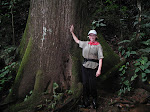Our rescued sloth survived surgery yesterday – apparently
anesthesia is a tricky business for sloths – and he is now convalescing well,
with two metal plates and various pins ensuring that his fractured bones knit
back together properly. He had compound
fractures of both an arm and a leg. I am
so impressed with how vets must understand all these different animal
physiologies in order to diagnose and treat.
We human healthcare workers only need to study human physiology,
although I assume that much is the same.
photo: Sloth receives titanium plate during surgery at the Refugio Herpetologico of Costa Rica.
Fractured bones sometimes need titanium plates and our little sloth received the human kind. He will now need several weeks to recover before release, and so will remain at the Refugio Herpetologico de Costa Rica, in the capable hands of Rodolfo and his team of volunteers. You can follow all the rescued animals Rodolfo brings to the Refugio by consulting their website at www.refugioherpetologico.com, where you can also make a secure donation (at the Gift Site tab) if you would like to help support the good work they do with rescued animals. This little sloth will return to the wild only when Rodolfo feels he is completely recovered and ready.
photo: Sloth receives titanium plate during surgery at the Refugio Herpetologico of Costa Rica.
Fractured bones sometimes need titanium plates and our little sloth received the human kind. He will now need several weeks to recover before release, and so will remain at the Refugio Herpetologico de Costa Rica, in the capable hands of Rodolfo and his team of volunteers. You can follow all the rescued animals Rodolfo brings to the Refugio by consulting their website at www.refugioherpetologico.com, where you can also make a secure donation (at the Gift Site tab) if you would like to help support the good work they do with rescued animals. This little sloth will return to the wild only when Rodolfo feels he is completely recovered and ready.
Capuchin monkeys at Refugio Herpetologico de Costa Rica. We, like sloths, have plenty of company living in a
forest. The white-faced, capuchin
monkeys came right up to the house this morning and started raiding my baskets
of citrus just out on the terrace. The
whole tribe with babies all came up to the house for the feast. They’re not used to me being back living in
the house; they think it’s still empty.
Well, I’m home now, and I want all the wild life off the roof and
terrace and out of the pool. The monkeys
don’t need to eat my baskets of fruit sitting on the terrace – they can eat
plenty of fruit growing in the orchards and the forest. Out…Out…Fuera! And that goes for the Green Iguana in the
pool, as well! I keep our spring-fed
pool fastidiously clean, as the humans around know all too well, and I don’t
like any species mucking it up… There is
abundant spring water just below in the forest; so go – shoo!
When I hollered at the monkeys this morning to get them off
the terrace, they shrieked and hissed at me – the adults have to give the
juveniles an example of how to hiss at humans – but the whole tribe did retreat
just a few meters back into the forest.
From there, however, they settled down to eat the oranges they’d stolen
and observe me, as I observed them back from the balcony. But then a pair of swallow-tailed birds
living out on the balcony, who also resented my coming home usurping their
privacy, whooped and fluttered about, letting me know just how they felt about
me too. And they didn’t even have a nest
there to protect (I always tolerate nests – leaving the birds in privacy until
after the fledglings leave)! So, all the
forest creatures will just have to get used to me again, as I’m back now,
outside on my balcony, living my own forest life.
We have collected a bumper crop of seeds from the forest
trees during this dry season, and so they are FREE to a good home. Available are:
Sura/Guayabon (Terminalia oblonga), Guayaquil (Albizia Syn. Pseudosamanea guachapele), Cocobolo
(Dalbergia retusa), Cedro amargo (Cedrela odorata), Cascarillo (Lafoensia punicfolia),
Jabillo (Hura crepitans), Volador (Gyrocarpus jatrophifolius), Ceibo verde
(Pseudobombax septenatum), Ceiba pentandra, Yuco (Bernoullia flammea), Peine de
Mico (Apeiba tibourbou), and a few vines.
Come and
get them!





No comments:
Post a Comment